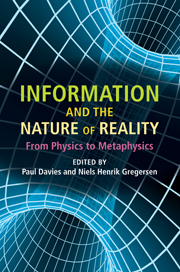Book contents
- Frontmatter
- Contents
- About the authors
- Acknowledgments
- 1 Introduction: does information matter?
- Part I History
- Part II Physics
- Part III Biology
- 7 The concept of information in biology
- 8 What is missing from theories of information?
- 9 Information and communication in living matter
- 10 Semiotic freedom: an emerging force
- 11 Care on Earth: generating informed concern
- Part IV Philosophy and Theology
- Index
- References
9 - Information and communication in living matter
from Part III - Biology
Published online by Cambridge University Press: 06 December 2010
- Frontmatter
- Contents
- About the authors
- Acknowledgments
- 1 Introduction: does information matter?
- Part I History
- Part II Physics
- Part III Biology
- 7 The concept of information in biology
- 8 What is missing from theories of information?
- 9 Information and communication in living matter
- 10 Semiotic freedom: an emerging force
- 11 Care on Earth: generating informed concern
- Part IV Philosophy and Theology
- Index
- References
Summary
Ever since the elucidation of the molecular basis of living systems, we have known that all elementary processes of life are governed by information. Thus, information turns out to be a key concept in understanding living matter (Küppers, 1990). More than that: the flow of information at all levels of the living system reveals the properties of communication. This means that the information stored in the genome of the organism is expressed in innumerable feedback loops – a process through which the genetic information is continually re-evaluated by permanent interactions with the physical environment to which it is exposed. In this way, the living organism is built up, step by step, into a hierarchically organized network of unmatched complexity.
The fact that all phenomena of life are based upon information and communication is indeed the principal characteristic of living matter. Without the perpetual exchange of information at all levels of organization, no functional order in the living organism could be sustained. The processes of life would implode into a jumble of chaos if they were not perpetually stabilized by information and communication. In this chapter, I should like to consider some of the consequences that follow from this for our philosophical understanding of reality.
ABOUT “INFORMATION” AND “COMMUNICATION”
In daily usage, the terms “information” and “communication” are not always clearly distinguished from each other. Yet, even the etymology of the two words indicates that the reference of the concepts cannot entirely overlap.
- Type
- Chapter
- Information
- Information and the Nature of RealityFrom Physics to Metaphysics, pp. 170 - 184Publisher: Cambridge University PressPrint publication year: 2010
References
- 4
- Cited by

